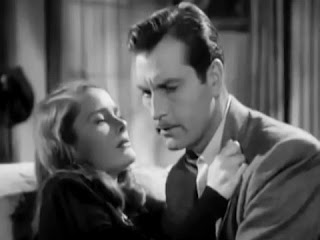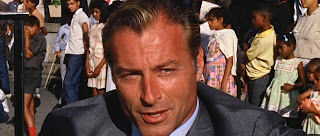 |
| Frank Lovejoy as McGraw |
THOSE FORGOTTEN PRIVATE EYE SHOWS.
Most baby boomers will have heard of and possibly even seen such well-known private eye/adventurer shows as
Peter Gunn with Craig Stevens,
Michael Shayne with Richard Denning,
Mike Hammer with Darren McGavin, and
Richard Diamond, Private Detective with David Janssen, among others. But back in the fifties and sixties there were a whole bunch of private detective shows that resurface from time to time on DVD or on youtube, but which never quite caught on with the public, or at least are not too well remembered all these decades later. For instance:
Meet McGraw, also known as
The Adventures of McGraw, lasted for one season and 42 episodes in 1957. Frank Lovejoy [
The Crooked Web] plays a sort of private eye who gets involved in various adventures. Lovejoy was good in the part, and first played the character on an episode of Singer's
Five Star Playhouse entitled "One for the Road." In this Audrey Totter plays a woman who supposedly wants protection from her jealous husband. Very few episodes of this show are available. The first one I saw, "The Fighter," about a boxer who is inexplicably nervous about his upcoming match, is supposed to be one of the best but is mediocre. Much better is "Ballerina," an interestingly convoluted piece with someone apparently trying to frame a dancer's husband for nefarious acts, with Hans Conreid as guest-star. I liked Lovejoy and hope someday to come across more episodes of this series. **1/2.
 |
| Philip Carey as Marlowe, outfitted with scar |
Philip Marlowe is, of course, Raymond Chandler's famous private eye, but this 1959 show only lasted for one season and 26 episodes. Philip Carey [
Zane Grey Theater] is fine in the part, and the show seems interesting. In "The Ugly Duckling" the mistress (Barbara Bain) of a married man is murdered and his wife (Virginia Gregg) is arrested; Marlowe tries to find out who really killed the woman. In "Murder is a Grave Affair" Gene Nelson plays a director with a dismissive wife (Betsy Jones-Moreland) whose delusional girlfriend is found murdered. Both episodes are good enough to make me wish more were available. **1/2.
The Files of Jeffrey Jones (aka
From the Files of Jeffrey Jones) only lasted for 16 episodes in 1952. I have seen one episode, "Pigeon Hunt," which has L.A. private investigator Jones (Don Haggerty) investigating when a boxer he knows tells him that he is afraid he might have murdered a woman while under the influence. Lyle Talbot plays his manager, and Alix Talton is a hard broad who is also involved in the case. Tristram Coffin plays a cop on the show. This episode was good enough to make me want to see more. There's a lively and amusing fight scene between Jones and a hulking bouncer in this one. **1/2.
 |
| Don Haggarty and Patricia Morison |
Don Haggarty [
Footsteps in the Night] also starred in another 1952 series, and this one lasted just 13 episodes:
The Cases of Eddie Drake. In this Haggarty plays a more traditional hard-boiled private eye; he also plays the role in a sexy fashion that has him practically leering at any woman he encounters. An interesting feature of this short-lived series in that the episodes unfold as flashbacks being told by Drake to a pretty lady shrink played by Patricia Morison. I've seen only one episode of the show, "Shoot the Works," and it is terrific, making me wish more of these classics were available. In "Shoot the Works" a wealthy, cheating wife hires Drake to find a watch given to her by her husband, but which was stolen during a robbery at a casino. The story has a number of interesting plot twists, real snappy dialogue, and is very well-acted by all, with Haggarty playing Drake in just the right note. A radio show entitled
The Cases of Mr. Ace and starring George Raft used the same device of having the private eye tell his stories to a shrink, and may have been the basis for this program. Haggarty would have made a terrific Michael Shayne. ***.
 |
| Lee Bowman as Ellery Queen |
Ellery Queen, or
The Adventures of Ellery Queen, debuted live on the Dumont network in 1950 with Richard Hart playing Queen. The character of Ellery Queen -- a novelist and amateur sleuth whose father is a police inspector -- is not forgotten, of course; in fact
Ellery Queen's Mystery Magazine is still being published. However, today people are more likely to remember the 70's
Ellery Queen TV series than any other. The 1950's show lasted several seasons, with Lee Bowman [
Next Time I Marry] eventually replacing Hart as the protagonist. Four or so seasons in, the show changed its name to
Murder Is My Business, and Hugh Marlowe was cast as Queen. In 1959 there came a new series,
The Further Adventures of Ellery Queen, this time starring George Nader as the hero.
Ellery Queen was a bit primitive, with that old organ music and all, but Hart and Bowman were both fine as variations of the character. Judging from the very few episodes I've seen, the show had some good scripts. In "The Hanging Acrobat" Kurt Katch makes an impression as the trapeze artist Hugo, whose wife is strangled. "Death Spins a Wheel," in which a piano player is murdered near a nightclub that may be a front for a counterfeiting racket, features another knock-put performance by Robert H. Harris as the club owner; this time he's affecting a very convincing accent. In "The Adventure of the Man Who Enjoyed Death," a mentally-disturbed district attorney, who lost a case due to Queen's testimony, gets even with him by playing a cat and mouse game in which he strangles a series of women. John Newland, best known as the host of
One Step Beyond, is very good as the D.A. In "Buck Fever" Queen gets involved in murder and corruption when a deputy is shot while deer hunting and the detective is initially accused. "Murder to Music" features Jerome Cowan as a maestro whose crippled wife seems neurotic and dangerous to his protege, a pretty young pianist named Anita, but she may be up to something. Cowan is as terrific as ever but the show is stolen by the excellent actress who plays Anita, but whose identity I could not uncover although I tried several sources. ***.
Updated on 9/25/2018.































